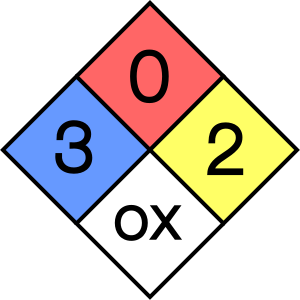NITRIC ACID
Basic information
- Chemical formula(s): \({\rm HNO_3}\)
- Other names: aqua fortis, engravers acid, hydrogen nitrate, red fuming nitric acid (RFNA), white fuming nitric acid (WFNA)
- CAS: 7697-37-2
- International Chemical Safety Card (ICSC): 0183
- Flammability: no
- NOAA’s description: pale yellow to reddish brown liquid generating red-brown fumes and having a suffocating odour, very toxic by inhalation, corrosive to metals and tissue
NFPA 704 (fire diamond)

- Health (blue): 3 - short exposure could cause serious temporary or moderate residual injury.
- Flammability (red): 0 - will not burn under typical fire conditions, will not burn in air unless exposed to a temperature of 820 °C for more than 5 minutes.
- Instability–reactivity (yellow): 2 - undergoes violent chemical change at elevated temperatures and pressures, reacts violently with water, or may form explosive mixtures with water.
- Special notice (white):
- OX - oxidizer - allows chemicals to burn without an air supply.
Hazard statements
| Code | Phrase |
|---|---|
| H272 | may intensify fire: OXIDISER |
| H300 | fatal if swallowed |
| H310 | fatal in contact with skin |
| H330 | fatal if inhaled |
| H373 | may cause damage to organs through prolonged or repeated exposure |
| H411 | toxic to aquatic life with long lasting effects |
Precautionary statements
| Code | Phrase |
|---|---|
| P210 | keep away from heat, hot surfaces, sparks, open flames and other ignition sources, no smoking |
| P220 | keep/store away from clothing/…/combustible materials |
| P260 | do not breathe dust/fume/gas/mist/vapours/spray |
| P305+P351+P338 | IF IN EYES: rinse continuously with water for several minutes, remove contact lenses if present and easy to do, continue rinsing |
| P310 | immediately call the ETH Emergency Desk: 888 (from landline) or +41 44 342 11 88 (from mobile) |
| P370+P378 | IN CASE OF FIRE: use water spray to reduce vapours, poisonous gases are produced in fire, DO NOT use chemicals or foam to extinguish |
Protective measures
Gloves
Occupational Safety and Health Act of 1970 and OSHA Glove Selection Chart categorize gloves into four protection levels (very good, good, fair, poor (not recommended)) for given chemical. The levels of protection against nitric acid for four types of gloves are:
- Neoprene: good for limited service.
- Natural latex or rubber: fair for limited service.
- Buthyl: fair for limited service.
- Nitrile: fair for limited service.
Safety goggles
- Always wear safety goggles when handling nitric acid. Corrective glasses are not considered safety googles.
- Handle nitric acid inside the fume hood only (with exception of moving the closed bottle to and from the storage cabinet).
Clothing
- Wear long trousers and fully covered shoes.
- Contact lenses are forbidden while working with chemical substances, even in combination with safety glasses.
- Do not wear cosmetics.
- Do not wear synthetic clothing while working with flammable liquids or gases or when a hazard is present as these materials tend to melt and stick to exposed skin.
- Do not wear headphones.
Spill management
- Use personal protective equipment.
- Avoid dust formation, avoid breathing dust.
- Avoid breathing vapors or mist.
- Ensure adequate ventilation.
- Evacuate personnel to safe areas.
- Sweep up without creating dust and arrange disposal.
- Do not let it enter drain.
- If a spill happened outside the fume hood (on the floor or desktop) contact Dr Jakub Tkaczuk (+41 44 632 31 62) and the ETH Emergency Desk (+41 44 342 11 88 from mobile or 888 from landline).